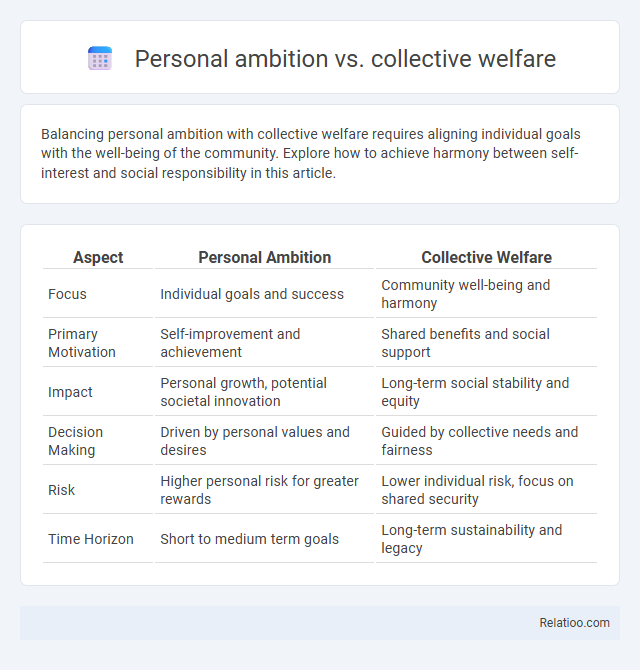Balancing personal ambition with collective welfare requires aligning individual goals with the well-being of the community. Explore how to achieve harmony between self-interest and social responsibility in this article.
Table of Comparison
| Aspect | Personal Ambition | Collective Welfare |
|---|---|---|
| Focus | Individual goals and success | Community well-being and harmony |
| Primary Motivation | Self-improvement and achievement | Shared benefits and social support |
| Impact | Personal growth, potential societal innovation | Long-term social stability and equity |
| Decision Making | Driven by personal values and desires | Guided by collective needs and fairness |
| Risk | Higher personal risk for greater rewards | Lower individual risk, focus on shared security |
| Time Horizon | Short to medium term goals | Long-term sustainability and legacy |
Defining Personal Ambition and Collective Welfare
Personal ambition refers to the individual's goals, desires, and aspirations aimed at achieving success, growth, or fulfillment in various life domains such as career, education, or personal development. Collective welfare encompasses the well-being and prosperity of a community or society as a whole, emphasizing shared resources, social equity, and public health. Balancing personal ambition with collective welfare requires recognizing how individual pursuits impact societal outcomes and fostering responsibilities that support social harmony and mutual benefit.
Historical Context: Individualism vs. Social Good
The tension between personal ambition and collective welfare has deep roots in historical debates about individualism versus social good, where Enlightenment thinkers championed individual rights while socialist movements emphasized communal responsibility. You navigate a legacy shaped by this dynamic, where economic progress often clashes with social equality, highlighting the ongoing challenge of balancing self-interest with societal obligations. Historical contexts reveal that societies thriving in both realms tend to integrate personal fulfillment with a commitment to social well-being.
The Psychological Roots of Ambition
The psychological roots of ambition are deeply intertwined with the human need for self-actualization, driving individuals to pursue personal goals that fulfill intrinsic desires for achievement and recognition. This internal motivation often conflicts with collective welfare and social obligations, as individual aspirations may prioritize personal success over communal benefits. Understanding these psychological drivers highlights the tension between self-interest and social responsibility, emphasizing the challenges in balancing ambition with the greater good.
Benefits of Pursuing Collective Welfare
Pursuing collective welfare enhances social cohesion by fostering shared resources and mutual support, leading to improved public health and economic stability. It drives inclusive policies that reduce inequality and promote sustainable development, benefiting the entire community. Prioritizing collective welfare encourages collaboration, which amplifies problem-solving capacity and creates a resilient society able to face complex challenges.
Tensions between Self-Interest and Community Needs
Personal ambition often clashes with collective welfare as individuals prioritize goals that may not align with community needs, creating tension between self-interest and social responsibility. Balancing these conflicting demands requires negotiating how personal achievements can contribute to, rather than detract from, the well-being of society. Social obligation functions as a mediator, urging individuals to consider the broader impact of their actions on communal harmony and sustainable development.
Balancing Ambition with Social Responsibility
Balancing personal ambition with social responsibility requires aligning your goals with the collective welfare to create meaningful impact. Pursuing individual success while considering social obligations fosters ethical decision-making and sustainable progress within communities. Emphasizing this balance promotes a harmonious integration of ambition and social good, benefiting both personal growth and societal well-being.
Case Studies: Successes and Failures
Case studies on personal ambition versus collective welfare reveal diverse outcomes, such as the success of cooperative enterprises like the Mondragon Corporation, which balances individual goals with community benefit. Conversely, failures like the Enron scandal highlight how unchecked personal ambition can undermine social obligation and corporate integrity. These examples underscore the critical need for aligning individual objectives with broader social responsibilities to achieve sustainable success.
Ethical Perspectives on Individual and Collective Priorities
Ethical perspectives on individual and collective priorities often highlight the tension between personal ambition and collective welfare, emphasizing moral theories such as utilitarianism, which advocates for maximizing overall happiness, and deontological ethics, which prioritizes duty and rights irrespective of outcomes. Social obligation underscores the ethical responsibility individuals bear toward community well-being, challenging purely self-interested pursuits by integrating concepts like distributive justice and social contract theory. Balancing these dimensions requires nuanced ethical reasoning to align personal goals with societal needs, fostering harmony between individual autonomy and collective good.
Impact on Society: Innovation, Progress, and Inequality
Personal ambition drives innovation and technological breakthroughs, fueling economic progress and societal advancement. However, unchecked ambition can exacerbate social inequality if collective welfare and social obligations are neglected, leading to resource imbalances and marginalized communities. You can foster a more equitable society by balancing individual goals with communal needs, ensuring that progress benefits all members.
Strategies for Harmonizing Personal Goals with Collective Interests
Aligning personal ambition with collective welfare requires adopting strategies such as collaborative goal-setting, which encourages individuals to pursue personal aspirations while contributing to community objectives. Implementing transparent communication channels fosters mutual understanding and supports cooperation between individual and social priorities. Incentivizing shared success through reward systems strengthens social obligation, ensuring that personal achievements benefit broader societal interests.

Infographic: Personal ambition vs Collective welfare
 relatioo.com
relatioo.com